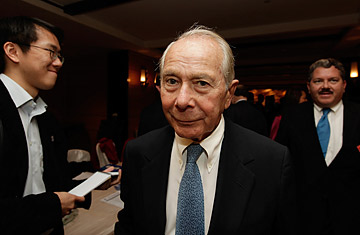
Maurice (Hank) Greenberg, chairman and CEO of C.V. Starr and Co. and former president and CEO of AIG
Maurice (Hank) Greenberg has said that all he ever wanted in life was "an unfair advantage," an insurance man's credo that propelled American International Group into a global powerhouse. Greenberg grew up with the now infamous company, becoming a world business power who dined with heads of state and influenced international trade policy — until risk caught up to him four years ago. An accounting scandal forced him to step down from his beloved company.
Now the odds may be working in Greenberg's favor again. The reported recklessness and greed of his successors at AIG have overshadowed any wrongdoing he is alleged to have committed. Since AIG's collapse last September, sources tell TIME, Greenberg has worked with the Federal Reserve and Treasury Department on a plan to rebuild the company. And today, the 84-year-old tycoon is scheduled to appear as the star witness at a House Oversight Committee hearing on AIG's fall and its economic repercussions. A committee aide called him "an investigative asset" who can further understanding of what happened to the corporate colossus that has received $170 billion in government bailout funds. (See the five lessons to learn from the AIG bonus blowup.)
Greenberg is not likely to escape tough questions. It was Greenberg, after all, who supervised Joseph Cassano, chief of AIG's Financial Products (FP) unit, whose sales of uncollateralized credit-default swaps brought down the company. Representative Peter Welch, a Vermont Democrat and committee member, blamed Greenberg for "allowing a culture to develop that completely contradicted the insurance-company ethic of limiting risk." Greenberg, Welch said, is trying to redeem his reputation on the grounds that "he was out the door before the roof fell in."
Trading in the lucrative swaps — which insured banks against losses on loans backed by mortgage securities — began on Greenberg's watch. But he is likely to argue that only after his ouster in March 2005 did the company's troubled FP unit fail to put up sufficient collateral to cover potential losses from the increasing number of loans backed by subprime mortgages. "You want to make sure you don't have any unexpected surprises down the road," he told TIME in a recent interview.
Greenberg is more eager to talk about the future. Instead of the government's plan to sell off parts of AIG, he believes the quickest way for taxpayers to recoup billions in federal bailout money is to rebuild the company. "Get AIG back so that it is a taxpayer and an employer again," he says.
The hearing will be a reduced stage for a man once wined, dined and courted by congressional leaders and Presidents — nearly all Republican — and backed by a large lobbying apparatus in Washington. He will appear not as a genius of finance but as the deposed chairman of a defamed colossus who still faces a civil lawsuit by the New York attorney general's office over accounting issues.
But at a time when Congress is looking to scalp those responsible for corporate misdeeds, the fact that Greenberg was invited as an expert — not a corporate villain — is a measure of his redemption.
"There are only handful of people who understand the workings of the global financial system as well as Greenberg," a Democratic committee staffer says. "He can provide some very valuable insight into what went wrong worldwide in the current financial crisis and how it can be fixed and what the government ought to do to stabilize things."
